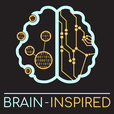
Summary: How does knowledge in the world get into our brains and integrated with the rest of our knowledge and memories? Anna and I talk about the complementary learning systems theory introduced in 1995 that posits a fast episodic hippopcampal learning system and a slower statistical cortical learning system. We then discuss her work that advances and adds missing pieces to the CLS framework, and explores how sleep and sleep cycles contribute to the process. We also discuss how her work might contribute to AI systems by using multiple types of memory buffers, a little about being a woman in science, and how it’s going with her brand new lab. Show Notes: Anna’s Penn Computational Cognitive Neuroscience Lab. Follow Anna on Twitter: @annaschapiro. Papers we discuss: The original Complimentary Learning Systems paper: Complimentary Learning Systems Theory and Its Recent Update. Anna’s work on CLS and Hippocampus: The hippocampus is necessary for the consolidation of a task that does not require the hippocampus for initial learning. Complementary learning systems within the hippocampus: a neural network modelling approach to reconciling episodic memory with statistical learning. Examples of her work on sleep: Active and effective replay: Systems consolidation reconsidered again. Switching between internal and external modes: A multiscale learning principle. Sleep Benefts Memory for Semantic Category Structure While Preserving Exemplar-Specifc Information.
